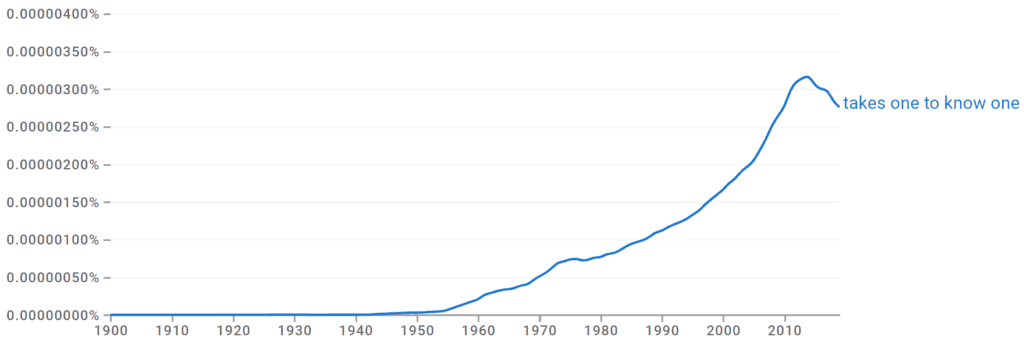“It takes one to know one” means that if you can identify a certain behavior in someone else, it’s probably because you’ve got a bit of that behavior in you, too. Think of it like this: if a friend says you’re always daydreaming and you reply with, “Well, it takes one to know one!” you’re suggesting they might be daydreamers themselves.
The phrase is occasionally used in the positive as well.
This cool way of responding is what we call an idiom. Idioms are quirky phrases in a language that might not make sense word by word, but they have a special meaning that native speakers understand. They’re like little shortcuts to express bigger ideas. Using idioms adds some flair to your chats and offers a glimpse into the culture behind the language.
In this article, we’re going to break down this idiom, learn about its origin and usage, and see how to use it with sentence examples. So, if you’re keen on adding some zest to your conversations, keep reading!
Understanding ‘It Takes One to Know One’ Meaning
“It takes one to know one” is a remark one makes when criticized by someone with similar failings. Often, it is used as a defense against a vague insult. For instance, if your neighbor says you are an idiot, you may reply with, “Well, it takes one to know one.”
Generally, when the phrase is used in a demeaning manner, it is considered a juvenile retort. It is mostly used by children (or people with an immature demeanor) as a clap-back when they cannot think of a suitable response to an insult.
Sometimes, the expression is used as a reply to a compliment. For example, if a scientist you admire comments on your science fair project and exclaims you are an excellent scientist, you might say, “Thank you! It takes one to know one,” pointing out that they’re awesome too.
It Takes One to Know One Examples
- Lisa called me a coffee addict this morning, and I just laughed, saying, “Well, it takes one to know one!”
- When Jake mentioned I always have the latest tech gadgets, I smirked and replied, “It takes one to know one, buddy.”
- After I teased Sophie about her sneaker obsession, she shot back with, “Hey, it takes one to know one!”
- My brother pointed out my newfound love for gardening. I chuckled, “Coming from you, it takes one to know one!”
- When Nina said I had an infectious laugh during the movie night, I winked and said, “It takes one to know one!”
Origins of It Takes One to Know One
Although the expression is attributed to the early 1900s in origin, variations of the saying have been documented as far back as the 1600s.
In “Pleasant notes upon Don Quixot,” the expression “set a fool to catch a fool” is used by Edmund Gayton in 1654:
The whimsy of the Knight, is to be cured with another whimsy, as they say, set a fool to catch a fool; a Proverb not of that gravity (as the Spaniards are,) but very useful and proper.
The earliest documentation of “It takes one to know one” seems to be from the Camden Post-Telegram in January 1926. The article, titled Woman Is Having Her Innings And At Present Outings Also Father Is No Longer Only Member of Family to Step on Cat’s Tail and Hold Clock’s Hands at Four O’Clock in Morning—Mamma Checks in Later, explains a man’s reflection of his behaviors when assuming his wife is holding down the household on her own:
Now he wonders who is helping her hold it down and he hurries home to take thumbprints. It takes one to know one, or words to that effect. / Woman has at last recognized the fact that the only thing that will bring a man home early is curiosity. He leaves his party on a dead run to save the cost of a detective.
It’s seen again in July 1935 in Motor Boating: The Yachtsmen’s Magazine in the article, Invitation for Los Angeles Hearst Gold Cup Regatta:
Applying the old saying, “It takes one to know one,” I am personally inviting you and your boat, your helmet, goggles and red life jacket, to participate.
Let’s Review
Although the exact origins of the phrase are somewhat unknown, variations of the expression “it takes one to know one” have been documented as far back as the 1600s. Popular in the early 20th century, the idiom is almost always used in a defensive manner against verbal insult. However, it can also be used in a positive way when placed in the proper context.
Much of its use is attributed to an immaturity on the part of both parties slinging insults, without intelligence, at one another.


